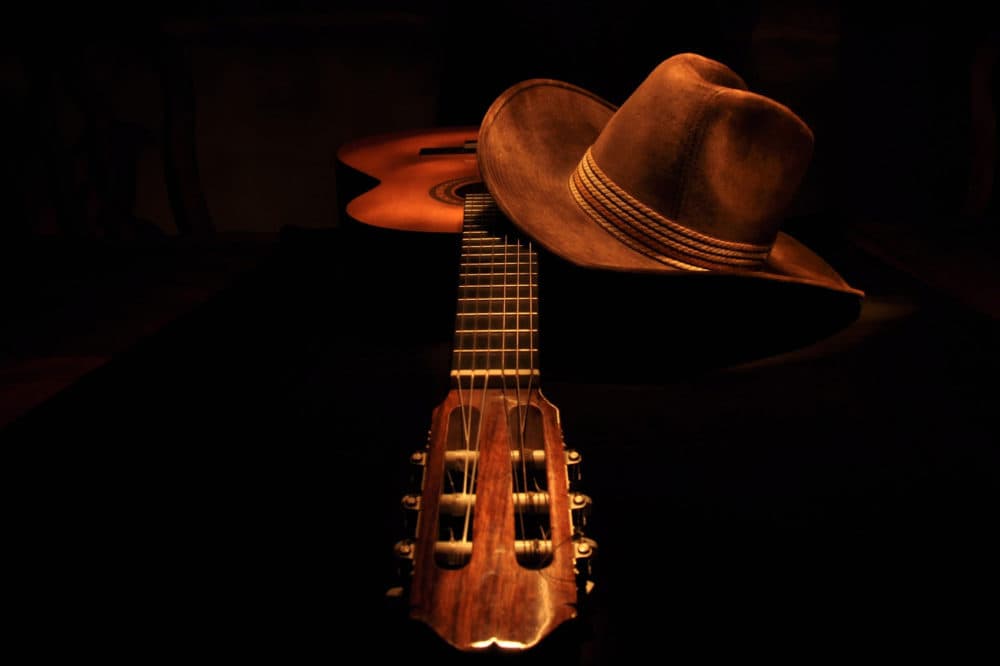Advertisement
On Country Music Airwaves, Female Artists Fight For Equal Play

With Meghna Chakrabarti
Women of country music are raising their voices against the old boys’ network in Nashville they say discriminates against them.
Guests
Beverly Keel, chair of the Department of Recording Industry at Middle Tennessee State University in Murfreesboro. Longtime music journalist, critic and commentator who currently writes for The Tennesseean newspaper and Parade magazine. Co-founder of Change the Conversation, a coalition designed to help fight gender inequality in country music. (@bevkeel)
Kalie Shorr, Country music singer-songwriter. Co-founder of the all-female Nashville songwriting collective and showcase Song Suffragettes. (@kalieshorr)
Kelleigh Bannen, country music singer-songwriter. Founder and host of the podcast "This Nashville Life," which explores the world of the country music industry. (@kelleighbannen)
Music From The Hour
From The Reading List
PBS NewsHour: "Shunned by country radio, female artists in Nashville are looking to break through" — "The proportion of female voices on country radio has been dropping in recent years, amid 'long-held beliefs' that male singers drive larger audiences and greater ad revenue. But not everyone in Nashville buys into that theory. Jeffrey Brown reports on how some female artists and industry experts there are banding together to build a community and raise the profile of women in country music."
The Tennessean: "3 years after 'Tomato-gate,' there are even fewer women on country radio" — "Three years have passed since 'Tomato-gate' — an uproar sparked by radio consultant Keith Hill, who compared female country artists to tomatoes in a salad.
"'If you want to make ratings in country radio, take females out,' he said in 2015. 'I play great female records ... they're just not the lettuce in our salad. The lettuce is Luke Bryan and Blake Shelton, Keith Urban and artists like that. The tomatoes of our salad are the females.'
"Hill cited research showing music created by women reflected 19 percent of songs played on country radio.
"The remarks sparked a proverbial food fight between music makers and country radio. For some, the flap sparked hope that bringing the issue to the surface would yield progress.
"It hasn't. In fact, by some metrics, women have lost ground in country music."
Elle: "The Women of Nashville's Music Scene Are Calling Time’s Up" — "It’s Monday night at the Listening Room Cafe in Nashville’s SoBro neighborhood, and the venue is nearly full for the dinner seating. The air is thick with the smell of barbecue; the servers are apologetic—they’re out of the pulled pork. We’re here to see 'Song Suffragettes,' Nashville’s preeminent (and only) weekly showcase for female songwriters. The lights come up, and out strides Kalie Shorr, a regular presence on the Song Suffragettes stage, followed by four young women holding acoustic guitars. Shorr sits on the center stool. Next to her is Candi Carpenter, her best friend and occasional writing partner. The rapport between all five women is collegial and affirming. They sing along to each other’s choruses. Their collective talent is palpable—and on a few songs, chill-inducing. By way of an intro, Shorr explains why this night is necessary: 'Women in Nashville deserve to be heard, even if they are not on the radio.' The audience, a few hundred deep, whoops and whistles in agreement.
"In the past few years, the number of female artists on country radio has been steadily declining. According to trade publication Country Aircheck, in 2016 female artists made up 13 percent of radio play; by 2017, that figure was down to a meager 10.4 percent. The country radio programmer quota–cum–excuse that fuels this inequity is that 'one woman an hour' is plenty. In response, labels have grown reluctant to sign female talent, knowing that radio won’t support them. Festival and tour promoters excuse the dearth of female country acts on lineups by pointing fingers at radio and labels, insisting that there are not enough bankable female artists to draw from—just superstar headliners like Miranda Lambert and Carrie Underwood.
"All of this, as both artists and activists attest, has created an environment in which women are locked out of opportunities and subject to systemic discrimination, and one in which a growing pool of talented young women are pitted against one another. Industry insiders say that the mechanisms that help establish an artist’s career—radio airplay, recording contracts, support slots on major tours, promotional commitments from labels, festival bookings—now rarely exist for female artists. This has created two classes of women in Nashville: superstars, and those whose careers are stalled on country music’s lowest rungs."
Brian Hardzinski produced this hour for broadcast.
This program aired on March 21, 2019.


